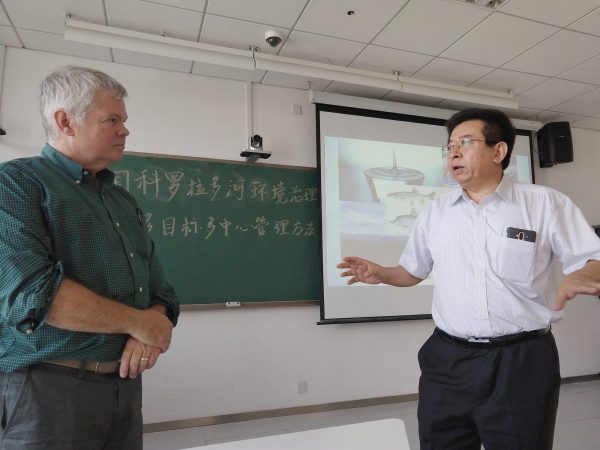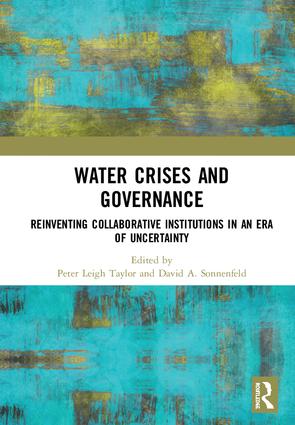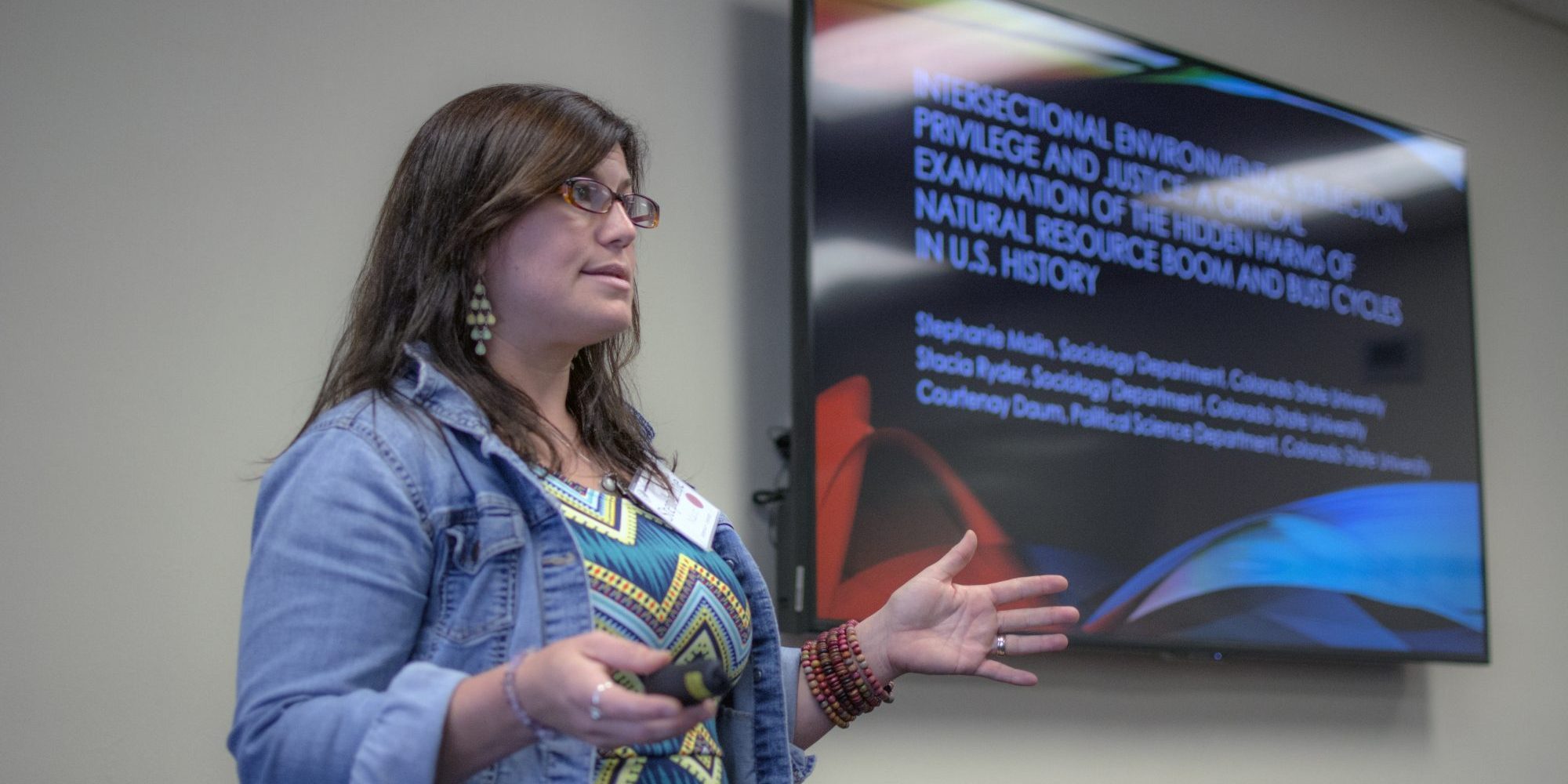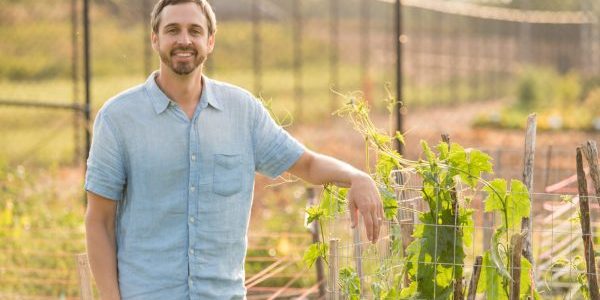Will there be enough water for everyone in the near future? Water equity affects us all and is one of the 21st century’s key environmental justice issues. While people may look to CSU’s engineers and watershed scientists for answers, the Department of Sociology also has an important role in ensuring water quality and access.
CSU is internationally known for its water expertise, and Sociology is home to some of CSU’s water specialists. “Increasingly, water managers and community leaders are involving social scientists in order to develop effective responses to today’s water challenges,” says Dr. Pete Taylor, Department of Sociology professor and chair. Including social scientists ensures that legal, economic and social barriers are considered when policies and collaborative efforts are designed and implemented.
Sociologists work directly with water stakeholders including farmers, engineers, urban developers, conservationists, lawmakers, and more. They connect individuals to groups and help groups understand individuals’ interests and behaviors. Without sociologists, scientific data is often undecipherable for everyday people, and concerns people have about their livelihoods are often misunderstood by decision-making groups. When sociologists bridge communication gaps, conversations flow and better solutions emerge.
Water Pressure
Taylor and research assistant Kelsea Macilroy, Sociology Ph.D. student, have worked with farmers, environmentalists, and government agencies along the Colorado River as key participants in the project “Moving Forward on Agricultural Water Conservation.” The Colorado Water Institute (CWI), a CSU affiliate that connects water experts with managers and users, designed the project, and the U.S. Department of Agriculture (USDA) funded it.
The Colorado River serves many purposes as it crosses several states, and agricultural users hold the largest percentage of its water rights. As populations grow and climate change and drought occur, cities and federal agencies have asked farmers to conserve and share their agricultural water to help prevent future shortages. But the effects of sharing this over-allocated resource vary considerably by stakeholder and involve real risks for farmers, so scientists – including sociologists – began researching the technical aspects of water flow, the social aspects of water law, and more.
Water rights are often the most important asset a farmer has, and only mother nature knows how much or how little will be needed from year to year. Water law here in the west is, in a nutshell, “use it or lose it,” meaning farmers who conserve water and share it may risk losing their rights to it in the future.
Taylor and Macilroy reviewed literature and conducted more than 50 in-depth interviews with stakeholders along the CRB. The sociologists found that many irrigation farmers are willing to cooperate, especially if they know their voices are being heard by policymakers. By bringing legal, economic, and social barriers to light, sociologists have supported water managers and legislators’ efforts to begin to put protections in place for farmers. Conversation and conservation are flowing.

The sociologists also found that collaborations are more successful when water conservation is considered as a community issue rather than just a farming issue. Their findings from six extensive case studies include innovative legal frameworks, economic incentives, irrigation agreements, and more solutions that are benefiting both rural and urban residents, and even endangered fish swimming in between.
Findings available here are being shared in CSU’s classrooms as well as in the Journal of Soil and Water Conservation and other articles for professional journals used by water practitioners, policymakers, and faculty at other universities. In June, Taylor was invited to Shanghai, China to present the case studies, barriers, and opportunities to the Chinese Academy of Social Sciences (CASS), one of the world’s most important social science think tanks. Several CSU sociology faculty also presented at CASS as part of a larger, multi-year initiative through CSU’s Vice President for Engagement Office to build ties worldwide around outreach and community engagement.
Tapping into the Community
CSU sociology associate professor Dr. Stephanie Malin is also bringing people together to share and disseminate successes. This fall’s special issue of CWI’s Colorado Water includes articles from citizens, authors, and academics who attended an event Malin co-organized at CSU, “Stories of Water Equity and Environmental Justice Symposium.”
Representatives from the Flint, MI water crisis and the Dakota Access Pipeline conflict shared their experiences, while others discussed access to safe water and sanitation as a human right, how natural disasters and hazards affect underrepresented communities, and much more.
The Ripple Effect
Sharing innovative solutions is vital, especially because water shortage is a global issue. Taylor and CSU sociology affiliate David Sonnenfeld, as co-editors of Society and Natural Resources, were interested in how water crises are being addressed worldwide. They put out a call for field-based findings by social scientists investigating water issues.
More than 120 submissions were received from around the world. The editors selected as many as their April 2017 issue could hold. Then, they co-authored a recent book “Water Crises and Governance: Reinventing Collaborative Institutions in an Era of Uncertainty” to share valuable tools for water managers, industry influencers, educators, and anyone willing to rethink highly complex environmental and social crises as opportunities.

Bridging Water and People
While Taylor’s research is in the dissemination phase, Malin is kicking off a new project. She and Dr. Josh Sbicca, also a CSU sociology assistant professor, are principal investigators for “Food-Energy-Water Systems Justice: Urban and Rural Corridors in the Rio Grande-Bravo Basin (RGB).” The project will identify critical environmental justice issues and opportunities in Colorado, New Mexico, Texas, and Mexico thanks to funding from CSU’s Water Center, which facilitates collaboration among more than 200 water experts on campus. Macilroy is also involved in this project as the program coordinator.


Malin is guiding graduate students as they map the large area’s community and environmental justice stakeholders, which include grassroots groups, government agencies, and everyone in between. The team is also creating geographic information systems and other comprehensive maps and databases of local socio-environmental systems. The flow of information and impact continues with webinar and listening sessions this spring.
By gathering residents’ input on possible legal, economic, and social ramifications prior to agencies putting large-scale plans in place, sociologists help ensure that partnerships among these groups and future regulations are equitable for everyone. “We bridge science and communities,” says Malin. “These projects build relationships by allowing us to interact with people on the ground.”
The Future of Access and Outreach
Successfully working together in the community begins in CSU’s classrooms. Sociology Ph.D. student Macilroy has significant roles in the CRB and RGB projects, and M.A. student Elizabeth Plombon is a research assistant at both CWI and CSU’s Water Center. Opportunities like these help build the next generation of social scientists by giving students hands-on experience not only as interviewers, analysts, and managers, but as team players working alongside scientists from other disciplines.
This fall the National Science Foundation (NSF) awarded funding to another team Malin is helping lead on campus. Their project “Interdisciplinary Training, Education and Research for Food-Energy-Water Systems in Semi-Arid Regions” also aims to ensure equitable access to resources. The NSF is investing over $2.9 million in five years of funding for engineers, natural resource scientists, and sociologists to collaborate on complex problems as they continue CSU’s traditions of research, outreach, and community engagement.
